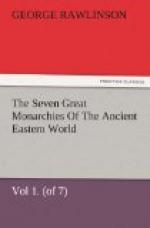Oxford, November, 1870.
PREFACE TO THE SIXTH MONARCHY.
The following work is intended, in part, as a continuation of the ancient History of the East, already treated by the Author at some length in his “Five Great Monarchies”; but it is also, and more expressly, intended as a supplement to the ancient History of the West, as that history is ordinarily presented to moderns under its two recognized divisions of “Histories of Greece” and “Histories of Rome.” Especially, it seemed to the writer that the picture of the world during the Roman period, commonly put before students in “Histories of Rome,” was defective, not to say false, in its omission to recognize the real position of Parthia during the three most interesting centuries of that period, as a counterpoise to the power of Rome, a second figure in the picture not much inferior to the first, a rival state dividing with Rome the attention of mankind and the sovereignty of the known earth. Writers of Roman history have been too much in the habit of representing the later Republic and early Empire as, practically, a Universal Monarchy, a Power unchecked, unbalanced, having no other limits than those of the civilized world, engrossing consequently the whole attention of all thinking men, and free to act exactly as it pleased without any regard to opinion beyond its own borders. One of the most popular enlarges on the idea—an idea quite inconsistent with the fact—that for the man who provoked the hostility of the ruler of Rome there was no refuge upon the whole face of the earth but some wild and barbarous region, where refinement was unknown, and life would not have been worth having. To the present writer the truth seems to be that Rome never was in the position supposed—that from first to last, from the time of Pompey’s Eastern Conquests to the Fall of the Empire, there was always in the world a Second Power, civilized or semi-civilized, which in a true sense balanced Rome, acted as a counterpoise and a check, had to be consulted or considered, held a place in all men’s thoughts, and finally furnished a not intolerable refuge to such as had provoked Rome’s master beyond forgiveness.
This Power for nearly three centuries (B.C. 64 — A.D. 225) was Parthia, after which it was Persia under the Sassanian kings. In the hope of gradually vindicating to Parthia her true place in the world’s history, the Author has in his “Manual of Ancient History” (published by the Delegates of the Clarendon Press) placed the Parthians alongside of the Romans, and treated of their history at a moderate length. But it has seemed to him that something more was requisite. He could not expect that students would be able to give Parthia her proper place in their thoughts unless her history were collected and put forth in a readable form with some fulness. He has, therefore, employed most of his leisure during the last two years in writing the present work, which he commends to students of the later Greek and Roman periods as supplemental to the modern Greek and Roman histories in which those periods are commonly studied.




